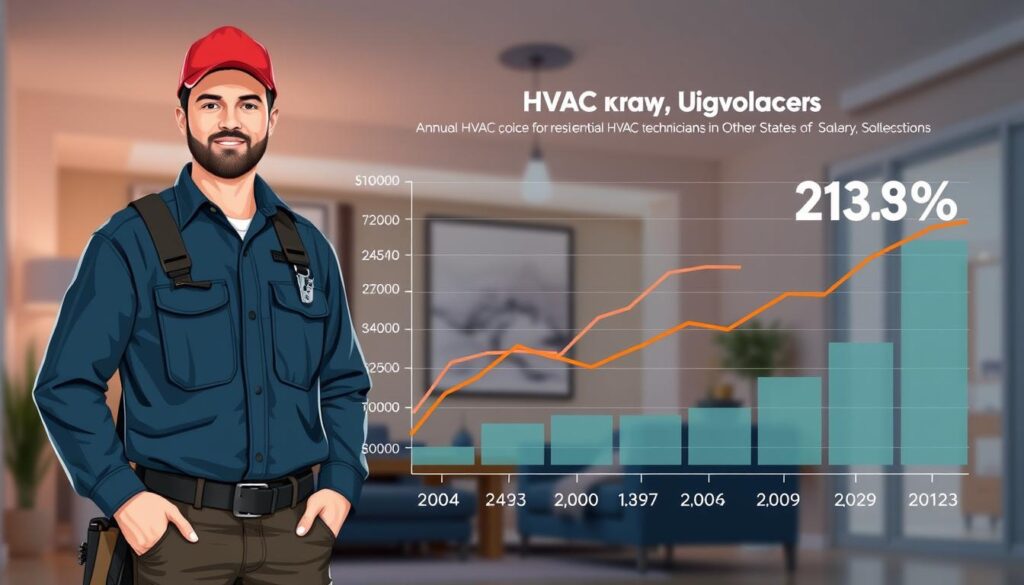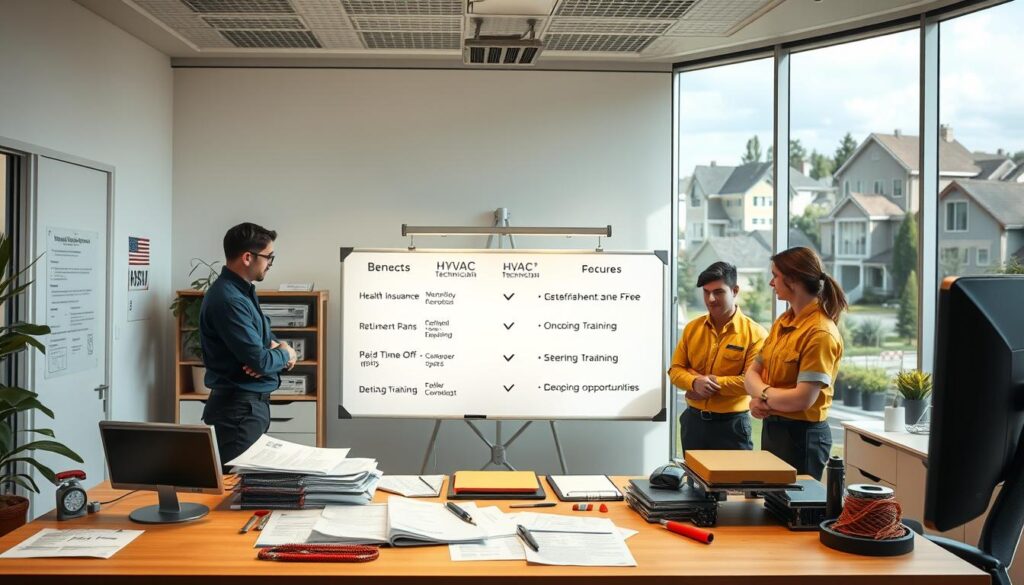Affiliate Disclosure
HVAC Guide Guys is a participant in the Amazon Services LLC Associates Program, an affiliate advertising program designed to provide a means for sites to earn advertising fees by advertising and linking to Amazon.
How Much Do Residential HVAC Techs Make in the US Today? Are you curious about how much residential HVAC technicians make? The field of heating, ventilation, and air conditioning is not just a job. It offers good money for those who are skilled.

The salary for HVAC technicians is changing fast. There are more chances to make money all over the US. If you’re wondering how much HVAC techs earn, you’re not the only one. They can make a pretty good salary each year.
Right now, HVAC technicians are making a wide range of salaries. Things like where they work, how long they’ve been doing it, and what they specialize in affect their pay. Whether they’re just starting or have been doing it for years, there’s room to grow.
Key Takeaways
- Average HVAC technician salary ranges from $21,500 to $96,000 annually
- Residential HVAC techs can earn around $49,500 per year
- Salary varies significantly by state and experience level
- Specialized certifications can boost earning
- Growing demand in the HVAC industry creates more opportunities
Table of Contents
Understanding the Current HVAC Technician Salary Landscape
The HVAC technician salary world is full of promise. People in this field earn well for keeping places comfy. Your pay depends on several things that shape the income landscape.
The average HVAC technician makes about $49,500 a year. They usually earn between $20 and $25 an hour. Your pay can change based on a few important factors.
Pivotal Factors Determining Base Pay
Your pay can be affected by:
- Where you live
- How long you’ve been working
- Any special certifications you have
- Who you work for (homes, businesses, factories)
- Your skills and how well you do your job
Industry Growth and Wage Increase
The HVAC industry is growing fast. The U.S. Bureau of Labor Statistics says it will grow by 9% from 2023 to 2033. This means more jobs and higher pay for skilled technicians.
“The demand for skilled HVAC professionals continues to rise, creating excellent career prospects.” – Industry Expert
As you get better and gain experience, you can earn more. Starting jobs pay less, but you can make more by learning and specializing.
State-by-State Salary Comparison for HVAC Technicians
HVAC service technician wages vary a lot across states. Your earnings as an HVAC maintenance technician can change a lot based on your location.
The salary for HVAC professionals shows interesting regional differences. Some states pay more because of their unique market, demand, and cost of living.
- Alaska leads with the highest average salaries
- Florida represents the lower end of the wage spectrum
- Coastal and industrial states tend to offer more competitive rates
Let’s look at how HVAC technician earnings vary by state:
| State | Average Annual Salary | Ranking |
|---|---|---|
| Alaska | $75,660 | 1st |
| California | $68,350 | 2nd |
| New Jersey | $65,700 | 3rd |
| District of Columbia | $63,230 | 4th |
| Florida | $46,940 | 50th |
When looking at HVAC technician earnings, think about more than just the salary. Local economy, industry demand, and cost of living are key factors in your income.
Plan your career by researching state markets and local HVAC trends. Find areas with strong growth to boost your career.
Experience Levels and Their Impact on HVAC Income
Your earnings as a residential HVAC repairman increase with experience. Knowing how your salary changes with career growth helps plan your path. This way, you can make the most of your income.
The HVAC field offers clear career advancement paths. Each level has its own salary range. Let’s explore the earnings at each career stage.
Entry-Level Positions
At the start, your salary ranges from $35,000 to $52,300 a year. You’ll focus on:
- Developing core technical skills
- Learning industry best practices
- Gaining hands-on experience
Mid-Career Earnings
With more experience and certifications, your salary jumps. Mid-career workers earn about $63,500 yearly. This phase includes:
- Handling more complex HVAC installations
- Developing specialized technical knowledge
- Building a strong client reputation
Senior-Level Compensation
Experienced technicians with 10-15 years earn impressive salaries, often over $74,500. Senior-level workers typically:
- Manage complex projects
- Provide advanced technical consulting
- Mentor junior technicians
“Your skills and experience are your most valuable assets in the HVAC industry.” – HVAC Professional Association
Your salary grows with your commitment to learning and skill improvement in HVAC.
Explore Our HVAC Shop
Looking for top-rated HVAC tools, parts, and accessories? Visit our shop and find the perfect solution for your needs.
Visit the ShopExplore Our HVAC Shop
Looking for top-rated HVAC tools, parts, and accessories? Visit our shop and find the perfect solution for your needs.
Visit the ShopHow Much Do Residential HVAC Techs Make in Different Regions
Looking at the hvac tech pay scale across different regions shows interesting facts. Your earnings can change a lot based on where you work in the United States.
How much residential HVAC techs make can vary a lot. Things like climate, local economy, and demand for services affect their pay.
- Northeast Region: Higher population density drives competitive wages
- Midwest Region: Stable but slightly lower compensation rates
- Southwest Region: Growing market with increasing demand
- West Coast: Highest average salaries due to technological innovation
- Southeast Region: Emerging market with steady growth
Several factors affect how much you can earn:
- Local cost of living
- Seasonal HVAC needs
- Economic infrastructure
- Technological advancements
- Competition among service providers
Your location can greatly affect your earnings as an HVAC technician. Cities usually pay more than rural areas. This is because cities need more services and have more complex installations.
Top-Paying States for HVAC Professionals
Choosing a career as an HVAC technician can be influenced by where you work. Some states pay HVAC technicians much more than others. This makes them great places for HVAC experts to work.
HVAC contractor salaries vary a lot in the United States. Knowing which states pay the most can help you choose the best place to work.
California: Leading the HVAC Salary Ranking
California is a top choice for HVAC workers, with an average salary of $59,200. The state’s strong tech and construction industries need skilled HVAC technicians.
- Complex climate zones requiring advanced HVAC systems
- High cost of living driving competitive wages
- Extensive commercial and residential development
New Jersey: Strong Compensation for HVAC Experts
New Jersey is close behind, with an average salary of $58,300. The state’s crowded areas and old buildings offer many job chances for HVAC pros.
Washington: Emerging HVAC Market
Washington is third, with an average salary of $58,000. The state’s growing tech scene and focus on energy efficiency mean more jobs for HVAC experts.
| State | Average Salary | Key Factors |
|---|---|---|
| California | $59,200 | Tech industry, diverse climate |
| New Jersey | $58,300 | Dense population, infrastructure needs |
| Washington | $58,000 | Tech growth, energy efficiency |
Your earnings as an HVAC pro depend on many things. These include where you work, how long you’ve been doing it, and what you specialize in. The top-paying states show the chance for good money in HVAC.
Explore Our HVAC Shop
Looking for top-rated HVAC tools, parts, and accessories? Visit our shop and find the perfect solution for your needs.
Visit the ShopUrban vs Rural HVAC Tech Salaries

Looking at residential hvac tech income, where you work matters a lot. Urban and rural areas have different pay levels for HVAC workers.
In cities, HVAC techs usually earn more. This is because of several reasons:
- More people need HVAC services in crowded areas.
- The cost of living is higher, so wages go up.
- There are more complex projects to work on.
- Big construction projects are common.
In rural areas, HVAC techs face different challenges. Salaries might be lower, but there are benefits:
- There’s less competition among technicians.
- Running a business costs less.
- Building a strong reputation in the community is easier.
- You might have a bigger area to serve.
“Location can significantly impact your earning as an HVAC professional.” – Industry Expert
Your earnings will depend on the local market, your skills, and how well you meet client needs. Both city and country settings have their own benefits for HVAC techs who aim to provide top-notch service.
Education and Certification Impact on Earnings
Improving your HVAC career means investing in education and certifications. These credentials can greatly increase your earnings. They also open up more opportunities in the competitive HVAC field.
Certifications are key to your earnings as an HVAC technician. They show your skills and dedication. This makes you more attractive to employers.
Required Certifications for HVAC Professionals
- EPA 608 Certification (mandatory for handling refrigerants)
- State-specific licensing requirements
- OSHA safety certification
Optional Certifications for Enhanced Pay
Getting extra certifications can really boost your value and earnings.
- NATE (North American Technician Excellence) Certification
- HVAC Excellence Professional Level Certification
- R-410A Certification
Continuing Education Benefits
Keeping up with new industry trends through learning can lead to better pay.
| Certification | Potential Salary Increase | Career Impact |
|---|---|---|
| NATE Certification | 5-10% salary boost | Advanced technical recognition |
| EPA 608 Advanced | 3-7% wage increment | Specialized refrigerant expertise |
| Professional Training Courses | 2-5% earning increase | Expanded skill set |
Investing in your professional growth is essential for a successful HVAC career. It can significantly increase your earning power.
Performance-Based Pay and Commission Structures
HVAC mechanics can earn more through performance-based pay. This model rewards them for their sales skills and service quality. It offers financial incentives beyond just hourly wages.
Common commission structures for HVAC pros include:
- Sales percentage commissions on new system installations
- Performance bonuses for customer satisfaction ratings
- Incentive payments for upselling maintenance contracts
- Profit-sharing programs for high-performing technicians
Knowing how HVAC mechanics get paid is key. Experienced techs can earn a lot more than their base salary. They do this by excelling in customer service and technical skills.
“Success in performance-based pay depends on combining technical skills with strong sales capabilities,” says industry expert Michael Rodriguez.
The best HVAC pros balance technical skills with customer service. By focusing on quality and smart sales, they can increase their income by 20-30%.
Here are some tips for maximizing performance-based pay:
- Keep improving your technical skills
- Work on your customer communication
- Understand what clients really need
- Always maintain high professional standards
Technicians should look at both base salary and commission when choosing jobs. This helps them pick the best HVAC industry opportunities.
Explore Our HVAC Shop
Looking for top-rated HVAC tools, parts, and accessories? Visit our shop and find the perfect solution for your needs.
Visit the ShopBenefits and Additional Compensation Packages
HVAC technicians get more than just their base pay. They also get a range of benefits that make their job more rewarding. These extras help them see the real value of their salary.

HVAC pros enjoy many perks beyond their salary. These benefits aim to make them financially secure and happy at work.
Health Insurance and Retirement Plans
Top HVAC companies offer great health insurance. This includes:
- Medical coverage
- Dental insurance
- Vision care
- 401(k) retirement plans
Overtime and Holiday Pay
Technicians can earn more than regular hours. They can get extra pay for:
- Overtime rates (often 1.5x standard pay)
- Holiday pay bonuses
- Emergency call compensation
Company Vehicle and Tool Allowances
Some employers give extra money for:
| Benefit Type | Typical Value |
|---|---|
| Company Vehicle | $300-$500 monthly |
| Tool Allowance | $500-$1,000 annually |
| Fuel Reimbursement | $100-$250 monthly |
These benefits can really boost your total compensation package. HVAC can be a very rewarding career financially.
Career Advancement Opportunities and Salary Growth
Being an HVAC technician opens doors to exciting career growth and higher earnings. The field has many ways to move up and increase your income. This can lead to a better hvac technician salary.
There are several paths to advance in the HVAC field:
- Supervisory Roles: Move from doing the work to leading teams
- Specialized Certifications: Get better at advanced system design
- Business Ownership: Start your own HVAC service company
- Energy Efficiency Consulting: Become a green expert
Those who keep learning can earn more. Skills like installing commercial systems, managing energy, and using green tech can make you more valuable.
“The HVAC industry rewards those who continuously upgrade their skills and knowledge.” – HVAC Industry Expert
Your salary can grow with smart career choices. Getting advanced certifications, gaining varied experience, and improving customer service can help. This can boost your career and earnings.
To climb the HVAC career ladder, network with others in the field. Attend workshops and stay current with new tech and trends.
Explore Our HVAC Shop
Looking for top-rated HVAC tools, parts, and accessories? Visit our shop and find the perfect solution for your needs.
Visit the ShopMarket Demand and Future Salary Projections
The HVAC industry is growing fast, opening up great opportunities for those in residential HVAC tech. The job market for HVAC installers is looking up, with big career chances ahead.
Several factors are driving this growth:
- More people want energy-saving home systems.
- The construction and renovation markets are getting bigger.
- New heating and cooling tech is coming out.
- People are becoming more aware of the environment.
The Bureau of Labor Statistics says HVAC tech jobs will grow by 9% from 2023 to 2033. This means about 37,700 new jobs every year. It’s a good sign for those thinking about a career in HVAC installer pay.
| Job Market Indicator | Projection |
|---|---|
| Annual Job Openings | 37,700 |
| Growth Rate (2023-2033) | 9% |
| Median Salary Increase | Expected 5-7% |
Knowing about new tech and green energy will help you earn more in HVAC. Techs who keep up with new tech and get special certifications will see their salaries grow the most.
As rules get stricter and people want better cooling and heating, the need for skilled HVAC workers will keep going up. This means good money for those thinking about a career in residential HVAC tech in the next ten years.
Conclusion
The HVAC industry is full of chances for skilled technicians looking for stable jobs. Your success depends on improving your skills and knowing about hvac service technician wages. With the right planning and learning, you can earn well in this field.
Getting professional certifications and focusing on residential HVAC can boost your earnings. Places like California, New Jersey, and Washington offer the best pay. But, your growth depends on your skills, the demand, and keeping up with new tech.
HVAC pros with great technical skills and customer service will always be needed. Your career can lead to great pay, whether you start as a beginner or aim to be a senior with advanced certifications.
Success in HVAC isn’t just about making money now. It’s about building a lasting career. Stay updated with trends, keep learning, and build a strong reputation. This way, you can have a rewarding and stable future in this important field.

